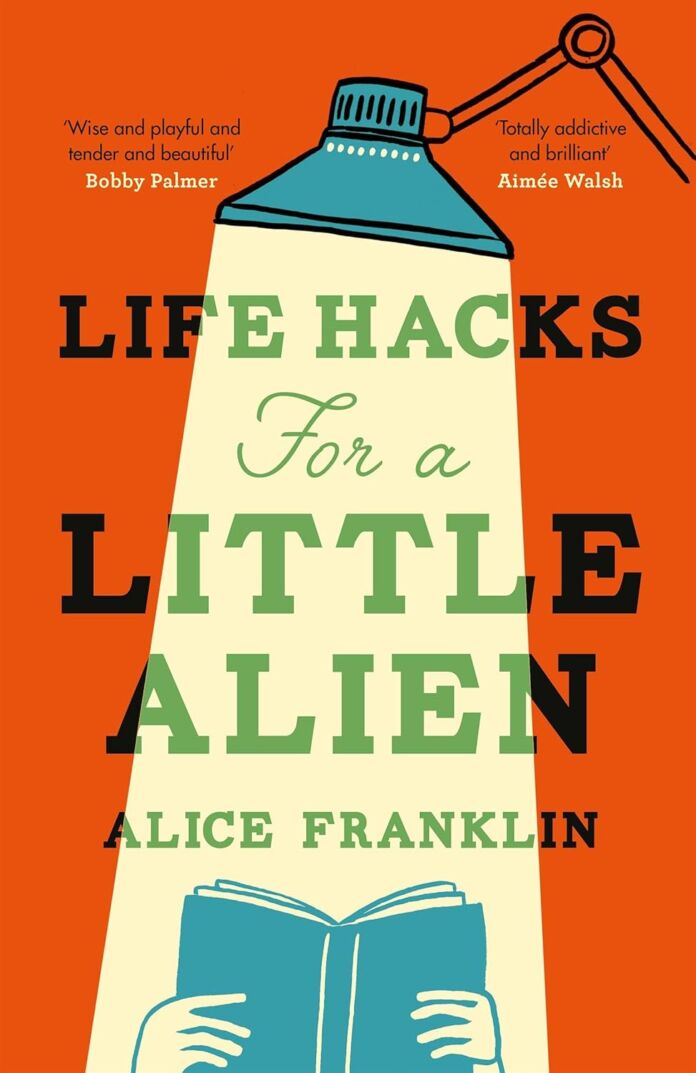In her debut novel “Life Hacks for a Little Alien,” Alice Franklin crafts an extraordinary tale that defies easy categorization. Part coming-of-age story, part exploration of neurodivergence, and part celebration of bibliophilia, the novel follows an unnamed protagonist’s journey through childhood and early adolescence as she navigates a world that often feels alien to her.
The Story and Its Telling
The narrative unfolds through the unique voice of an omniscient narrator who addresses the protagonist as “Little Alien” – a metaphorical device that brilliantly captures the essence of feeling perpetually out of place. This narrator, whose identity becomes clear only towards the end, provides both commentary and comfort throughout the protagonist’s journey.
The story begins with the protagonist’s first words—not the typical “mama” or “dada,” but rather “I’m dying a spider” (which turns out to be a beetle). This opening scene masterfully sets up the central themes of miscommunication and perception that run throughout the novel. Franklin’s prose is precise yet playful, peppered with linguistic observations and footnotes that add depth without disrupting the narrative flow.
Strengths and Literary Merit
Innovative Narrative Structure
Franklin employs a unique narrative structure that mirrors her protagonist’s experience of the world. The story moves in what the narrator calls “gloopily” passages of time, with certain moments examined in microscopic detail while others slip by in summary. This approach effectively conveys the protagonist’s selective perception and intense focus on particular aspects of life.
Language and Linguistics
The novel’s preoccupation with language is both a plot device and a metaphor. The protagonist’s fascination with the Voynich Manuscript – a real medieval codex written in an undeciphered script – serves as a perfect metaphor for her struggle to understand and be understood. Franklin’s background in linguistics shines through in the detailed observations about language acquisition, etymology, and the nature of communication.
Character Development
The protagonist’s journey from a confused child to a young teenager finding her path is beautifully rendered. Supporting characters are equally well-drawn, particularly:
- The anxious mother, whose own struggles with mental health parallel her daughter’s sense of alienation
- The methodical father, trying to maintain order in an increasingly chaotic situation
- Bobby, whose friendship offers the protagonist a glimpse of connection and understanding
Areas for Improvement
While the novel excels in many areas, there are some aspects that could have been stronger:
- The pacing in the middle section occasionally lags, particularly during the extended sequences at the library
- Some secondary plot threads, such as the relationship with Cousin Paul, feel underdeveloped
- The resolution of the mother’s mental health storyline could have been explored more deeply
Thematic Analysis
The Power of Language
Franklin explores how language both connects and separates us. The protagonist’s intense focus on words and their meanings highlights how neurodivergent individuals might experience communication differently from others.
Libraries as Sanctuaries
The novel presents libraries as spaces of both refuge and possibility. Through characters like Maggie and “Homeless Paul,” Franklin shows how these institutions can provide community and understanding for those who feel out of place elsewhere.
Identity and Belonging
The central metaphor of being an “alien” works on multiple levels, speaking to both the specific experience of neurodivergence and the universal feeling of being an outsider.
Writing Style and Technical Execution
Franklin’s prose is clean and precise, with moments of lyrical beauty that emerge organically from the protagonist’s perspective. The use of footnotes and linguistic asides could have been pedantic but instead adds layers of meaning and occasional humor to the narrative.
The author demonstrates particular skill in:
- Creating distinct voices for different characters
- Incorporating technical linguistic information without overwhelming the story
- Maintaining a consistent narrative tone while allowing for emotional depth
Impact and Significance
“Life Hacks for a Little Alien” makes a significant contribution to contemporary literature about neurodivergence by avoiding common pitfalls and stereotypes. Rather than presenting its protagonist as either a savant or a figure of tragedy, Franklin creates a fully realized character whose differences are neither minimized nor exaggerated.
Comparisons and Context
While the novel invites comparisons to works like “The Curious Incident of the Dog in the Night-Time” and “Eleanor Oliphant is Completely Fine,” it charts its own unique territory. Franklin’s focus on linguistics and the power of libraries adds fresh dimensions to the genre of neurodivergent literature.
Conclusion
“Life Hacks for a Little Alien” is a remarkable debut that manages to be both intellectually stimulating and emotionally resonant. Despite some minor pacing issues, Franklin has created a work that speaks to universal experiences of alienation while celebrating the unique perspectives that neurodivergent individuals bring to the world.
The novel is a good read for its innovative approach, strong character development, and thoughtful exploration of language and belonging. It represents an important addition to contemporary literary fiction and sets high expectations for Franklin’s future work.
Ideal Readers
This book will particularly appeal to:
- Readers interested in neurodivergent perspectives
- Language enthusiasts and bibliophiles
- Fans of coming-of-age stories with unconventional narratives
- Anyone who has ever felt like an outsider looking in
Final Thoughts
Franklin’s debut novel demonstrates extraordinary promise, offering a fresh voice in contemporary fiction. While there is room for growth in her craft, “Life Hacks for a Little Alien” establishes her as an author to watch, one who brings both intellectual rigor and emotional authenticity to her work.
The book’s greatest achievement lies in its ability to make readers see the world through different eyes while reminding us that feeling alien is perhaps one of the most human experiences of all.





